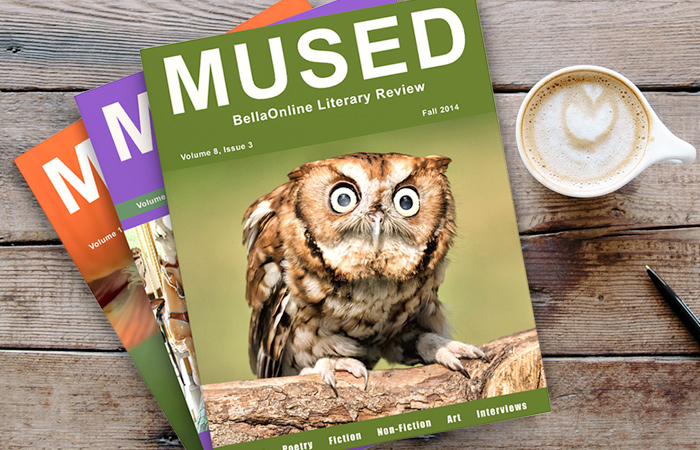-

-
Poetry Submission Information
Poetry Submission Guidelines
Poetry Types
Rhyming Poem Guidelines
Poetry Cliches to Avoid
Creating Immersive Poetry
Showing vs Telling Poetry
Poetry Submission Form
Main Submission Guidelines
General Mused Submission FAQs
Mused Contributor Bio and Photo
Calculating a Word Count
Proofreading Your Submission
Submission Guidelines for Poetry
MUSED - the BellaOnline Literary Review has no particular requirements for poetry as to form or genre. We like poetry that surprises us, twists us up, gets under our skin, and into our hearts. Quality precludes form and genre in every instance, so send us your very best work and if we like it, we'll print it.Cliches
The most common reason we reject a poem is that it is a cliche we've read literally a hundred times before. A wall divides us from others. Trees reflect the seasons of life. Hands which were once strong grow old. Please read our cliche recommendations to bring a fresh view to the topic you wish to address.
Poetry Cliches to Avoid
Generic Language
The second most common reason we reject a poem is that it uses generic language. Let's say we receive a poem that says:
a snowflake fell
from a sky
a person spoke
she said, "hi."
The reader has no way to properly interpret these vague instructions. Is it a quiet, tumbling snowflake from a soft cloudy sky? A hard-driven blizzard from a tumultuous sky? Is the person angry and screaming in rage? Is the person quiet, in gentle acceptance? The poet needs to present the scene clearly so we can visualize it. The words need to be specific and drawing in all the senses.
Creating Immersive Poetry
Showing vs Telling
When we read a poem, we want to experience the situation and feel the sensations. We want to be shown what is happening, not told what we should feel. So we would resist a poem that said:
He was angry
She was hurt
He pushed her
Into the dirt.
Feel sad.
We don't want to be told what happened and told what to feel. We want to experience the scene and feel our reactions naturally.
Showing vs Telling Poetry
Rhymed vs Unrhymed
We enjoy poetry that is rhymed as well as unrhymed poetry. It's important to keep in mind that if you start out with a rhyming poem of a certain rhythm, that it tends to confuse people if you suddenly stop rhyming or lose the rhythm. If you write a poem that reads:
Whose woods these are I think I know
His house is in the village though
Hey, maybe he will not notice that I paused for a moment
To see what is going on.
That loss of rhythm tends to be jarring. The best way to work on your poem is to read it aloud. Recite it to friends and family, and see how it rolls off the tongue. It can take time to "polish" a work until it flows smoothly - this is how you turn a rock into a gemstone!
Rhyming Poem Guidelines
Spelling and Grammar
Be sure to spell check your submission. We expect entries to be polished and in publishable shape. If you have numerous spelling errors in your work, it indicates to us that your work is not yet ready for publication.
Be sure to also check for common typos. If you are writing a contraction of "it is", there is always an apostrophe, "it's". If you are using any other use of "its" there is no apostrophe.
It's misty and tranquil this spring morning; let's go for a stroll along the beach.
Its hue a sickly yellow, the moon faded in and out of view behind a billowing raincloud.
Proofreading Your Submission
Artwork
Occasionally a poet has an image they would like to go with the poem. Every image run in Mused must be approved by the artwork team. Please submit your artwork separately in the artwork area. You have a note field there to indicate that it matches up with the poem you have also submitted.
Entry Details
Submissions are limited to three poems for a given issue. Each poem cannot exceed 40 lines in length. Note that long poems are very tricky to pull off well. They must suck you in at the beginning, like a good novel, and hold your attention solidly throughout. If you are going to attempt a long poem make sure you create a very strong start to it, to encourage the reader to keep going. That would then get submitted as a special entry in the fiction or non-fiction area.
BellaOnline is a world-wide publication read by people of all ages and all cultural backgrounds. Because of that we cannot run any sexual content or profanities.
Poetry Submission Guidelines
Poetry Types
Rhyming Poem Guidelines
Poetry Cliches to Avoid
Creating Immersive Poetry
Showing vs Telling Poetry
Calculating a Word Count
Proofreading Your Submission
Poetry Submission Form
